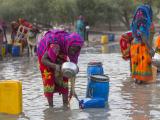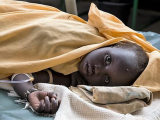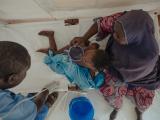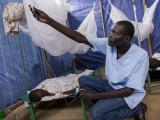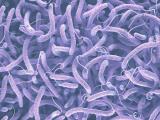Yemen will enter its rainy season this month with an ongoing cholera epidemic, and a new study based on the country's national cholera surveillance system describes how rain, along with multiple confounding factors, helped create the largest cholera outbreak in history and could well trigger another wave of the deadly disease.
The study, published yesterday in the Lancet Global Health, notes that Yemen's cholera epidemic is rooted in a civil war that broke out in March of 2015, disrupting infrastructure in two key ways: The war forced half of the country's clinics and hospitals to close, and it left half of Yemenis without clean water.
From September of 2016 to March of 2018, officials in Yemen recorded 1,103,683 suspected cholera cases (attack rate, 3.69%) and 2,385 deaths (case-fatality rate, 0.22%), the authors note.
Role of rainy seasons
Surveillance data point to three periods in this epidemic: the small first wave (Sep 28, 2016, to Apr 23, 2017), the increasing phase of the second wave (Apr 24, 2017, to Jul 2, 2017), and the decreasing phase of the second wave (Jul 3, 2017, to Mar 12, 2018).
The researchers believe the first, smaller wave of the epidemic (1,935 weekly suspected cases) seeded cholera bacteria across Yemen in the dry season. Then, when the rainy season of 2017 began, the bacteria flourished across the country, leading to widespread transmission in the second wave (50,832 weekly suspected cases.) The rainy season then, which has just begun in Yemen and typically runs through late August, is a major contributing factor to case spikes in this epidemic, the authors said.
"The second wave occurred synchronously across districts in Yemen, most of which had been affected during the first wave," the authors wrote. "The period of highest cholera transmission was limited to the 4 weeks of the spring rainy season, during which the daily national cholera incidence increased by 100 times and cholera spread across the entire country.
"These observations suggest that the transition between the dry and rainy seasons in April is key for WASH interventions in Yemen." WASH stands for water, sanitation, and hygiene practices used to reduce cholera transmission.
The authors also conclude, "These results suggest that cholera could resurge during the ongoing 2018 rainy season if transmission remains active. Therefore, health authorities and partners should immediately enhance current control efforts to mitigate the risk of a new cholera epidemic wave in Yemen."
In an accompanying commentary on the study, Michael Gormley, PhD of Heriot-Watt University, said the authors also raise the importance of Ramadan being a precipitating factor during this outbreak. The sharing of meals during the religious holiday may aid transmission of the bacteria, Gomley said, but more evidence is needed.
In an update yesterday, the World Health Organization Regional Office for the Eastern Mediterranean (WHO EMRO) reported that Yemen recorded 1,942 suspected cholera cases and 2 associated deaths during the most recent week for which data are available—Apr 9 through 15.
Vaccine campaigns in South Sudan, Uganda
In additions, several African countries are also facing ongoing cholera outbreaks.
Both South Sudan and Uganda are conducting oral cholera vaccination campaigns to squelch ongoing outbreaks. The WHO also reported a jump in cholera cases in Tanzania, and ongoing surveillance of an outbreak in Somalia.
According to the WHO in an Apr 27 update, cholera cases in Tanzania have increased by 27% in recent weeks. So far in 2018 officials have reported 711 suspected cases with 33 deaths (case-fatality rate, 1.9%); 266 cases were reported in April. In Somalia, the Ministry of Health announced 192 new cases of cholera and 1 death during the week of Apr 22, according to a separate WHO EMRO report yesterday. Somalia's latest outbreak began in December of 2017.
Cholera is endemic in South Sudan, but the country is currently experiencing its longest recorded cholera epidemic, with 20,000 suspected cases and 436 deaths reported in the country in 2018, according to a May 2 report from Medecins Sans Frontieres (MSF). The vaccination campaign is centered in Juba and will last until May 19.
Uganda launched its campaign after several people inside a refugee camp contracted cholera. So far this year, The Guardian reports, 45 people in Uganda have died from the disease. With the coming rainy season, Uganda said it expects thousands more refugees from the Democratic Republic of Congo.
See also:
May 3 Lancet Glob Health study
May 3 Lancet Glob Health commentary
May 3 WHO EMRO Yemen update
Apr 27 WHO report
May 3 WHO EMRO Somalia update
May 2 MSF notice
May 3 Guardian story




